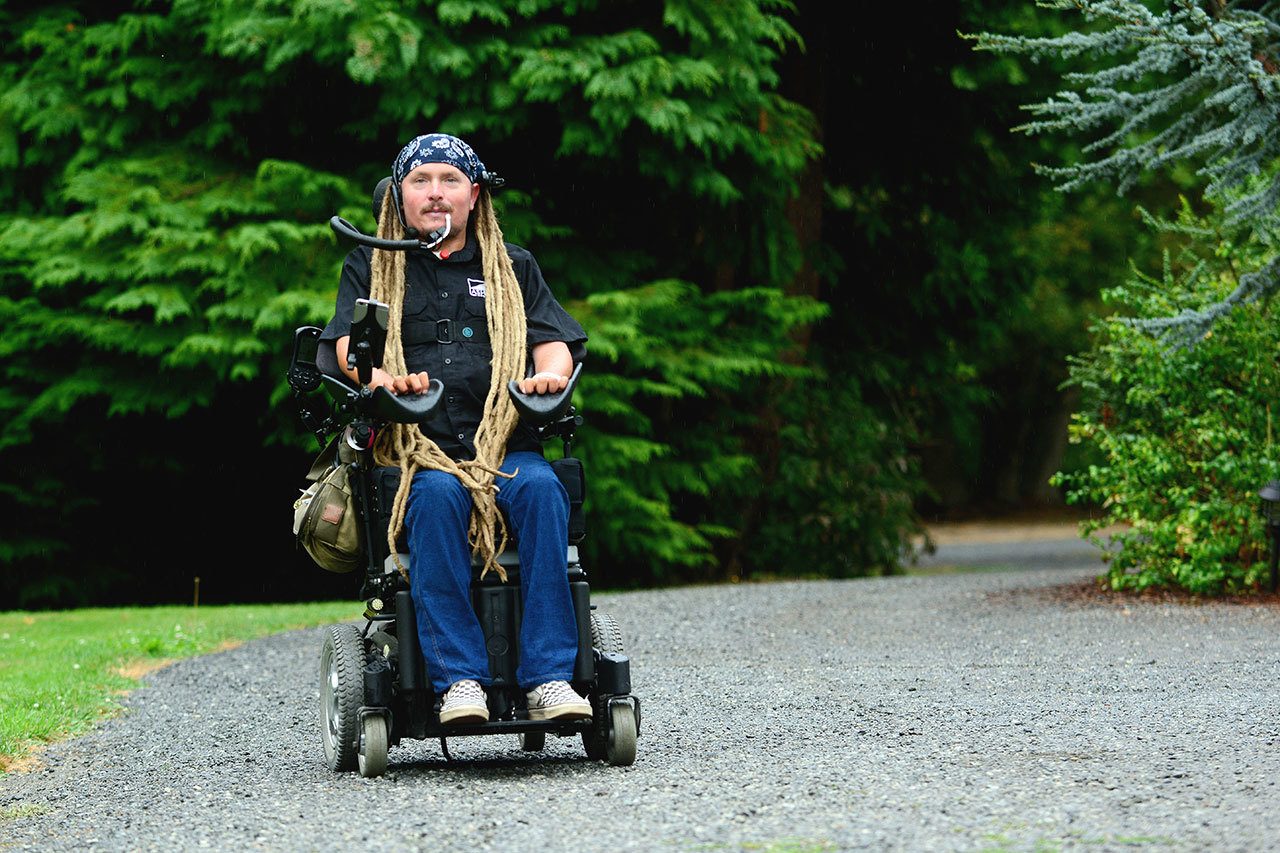PORT ANGELES — What started as a plan to ride a wheelchair across Washington with some friends — and enjoy a few cold beers along the way — ended up bringing international attention to the need for accessible trails.
Agnew resident Ian Mackay, who is paralyzed from the neck down, rode his wheelchair this month from Port Angeles, through British Columbia over to Anacortes and then down to Portland, Ore.
By the time he reached Portland, Mackay had been in the news so much — locally and internationally — it seemed everyone already knew of him and his mission to highlight the need for wheelchair-accessible trails in Washington.
It’s not a trip Mackay would recommend. He estimated that he spent about 75 percent of the 300-mile trip on the side of roads, often with little or no shoulder.
He had cyclists with him to help with visibility. He left Port Angeles on Aug. 13 and arrived in Portland, Ore., on Aug. 23.
“I found that you can do it,” he said. “The roads might not be super-accommodating for wheelchairs, but it was a hell of a ride.”
He avoided Interstate 5, but still found himself on highways with traffic going 55 mph. Most of the time people made space for Mackay, but others would get a little close, he said.
What he found on the trip is that in many places in Washington, it would be extremely difficult for someone to commute in a wheelchair.
“There’s a lot of places that the only way you can do that is on these very trafficked roads, and it sucks,” he said. “I hope that maybe, in some small way, what I did can cause some change.”
The trip took him 10 days of traveling at 7 mph, 8 hours per day.
Throughout the trip, Mackay kept his blog and Twitter account updated with how his journey was progressing.
At the end of each day, Mackay did what he always did when he toured a state on bike: He stopped for a cold glass of beer.
At the end of most days on the trip, Mackay and his crew stopped off at a brewery to enjoy a cold one. Often, the breweries paid for their beers and provided shirts for the cyclists to wear for the following day.
For Mackay, this trip was also a chance to relive when he used to ride bikes. After a bike accident 8 years ago left him immobile, he thought those days were over.
“Something I really enjoyed was long rides, touring through states, and I wanted to re-experience that,” he said. “I thought those days were over once I became a quadriplegic.”
He’s found that he really enjoys the Olympic Discovery Trail, which he said has helped him find himself again. Last summer, Mackay put about 2,300 miles on his chair.
Though he is wheelchair-bound, Mackay still considers himself a cyclist and a nature buff.
“I enjoy the trail systems up here immensely and attribute them to where I found my solace, where I was able to refind my identity after I broke my neck,” he said.
That is something every Washingtonian in a chair should be able to experience, he said.
“My brothers and sisters in chairs in the greater Seattle area should have that same privilege to be able to get out and see our state on something other than a highway,” he said.
His hope is that because of his ride, the state will become more accessible for people in wheelchairs. Mackay’s recommendation is adding an extra foot to the width of new roads being built to help accommodate people.
“If I lived in some of those areas and I had to commute, I would not feel safe getting from one town to another on some of these fast highways with no shoulders,” he said.
His journey brought international attention to his cause. A story by Mashable has more than 18,000 shares and helped fuel the numerous donations he received.
Mackay said donations poured in from every corner of the world. Funds raised went toward his trip. What was left over went to Washington Bikes to help make Washington more accessible.
He estimated that around $10,000 was donated for the trip. He’s still tallying up the final costs of the trip, but plans to donate whatever is left to Washington Bikes.
Mackay said he has been talking with Gov. Jay Inslee’s office to help guide policy.
The office sent him a memorandum that he is currently reviewing.
“I know one dude isn’t going to cause big change, but if we can increase awareness that’s all I’m looking for,” he said.
________
Reporter Jesse Major can be reached at 360-452-2345, ext. 56250, or at jmajor@peninsuladailynews.com.

